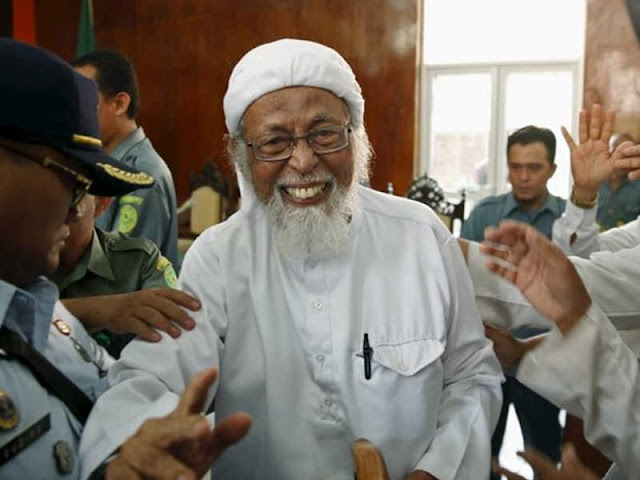Radical Cleric Linked to Bali Bombing to Be Freed from Prison
pada tanggal
Saturday, January 19, 2019
 JAKARTA, LELEMUKU.COM - A radical cleric thought to be the spiritual leader of the Bali bombers will be released from prison on medical grounds, Indonesia's president said Friday.
JAKARTA, LELEMUKU.COM - A radical cleric thought to be the spiritual leader of the Bali bombers will be released from prison on medical grounds, Indonesia's president said Friday.Abu Bakar Bashir, 80, is believed to have been a key figure in terror network Jemaah Islamiyah (JI), which was blamed for the 2002 bombings on the holiday island which killed more than 200 people, mostly foreign tourists.
It was Indonesia's deadliest militant attack and prompted Jakarta to beef up anti-terror cooperation with the U.S. and Australia, which has previously opposed clemency for Bashir.
Indonesian President Joko Widodo said on Friday that he had agreed to order the ailing preacher's release from a prison on the outskirts of the capital.
"The first reason is humanitarian," Widodo told reporters. "He is old ... and his health condition was also part of the consideration."
Widodo did not say when Bashir would be released, but one of the cleric's lawyers said it could be as early as next week.
Bashir, speaking from Gunung Sindur prison, welcomed the news.
"If I am released, I'll praise Allah," he told reporters, adding he was not hostile to the state.
In 2011, the firebrand preacher — once synonymous with militant Islam in Indonesia — was sentenced to 15 years in jail for helping fund a paramilitary group training in the conservative Islamic province of Aceh.
Bashir, the co-founder of an infamous Islamic boarding school known for producing militants, was jailed after authorities in the world's biggest Muslim majority country broke up the camp.
Several militants convicted over their involvement in the Bali bombings have been executed while two others, including Malaysian Noordin Mohammed Top, were killed in police raids in 2009 and 2010.
Bashir, who has repeatedly denied involvement in terror attacks, was also previously jailed over the Bali bombings but that conviction was quashed on appeal.
Militant-linked bombings
Al-Qaida-linked JI was founded by a handful of exiled Indonesian militants in Malaysia in the 1980s, and grew to include cells across Southeast Asia.
As well as the 2002 Bali bombings, the radical group was blamed for a deadly 2003 car bomb at the JW Marriott hotel in Jakarta and a suicide car bomb the following year outside the Australian embassy.
An anti-terror crackdown weakened some of Indonesia's most dangerous networks, including Jemaah Islamiyah.
The Islamic State group proved to be a potent rallying cry for Indonesia's radicals, with hundreds traveling to the Middle East to join the jihadists.
Last year, a wave of deadly suicide bombings at churches and a police post rocked Indonesia's second biggest city Surabaya.
Those attacks were carried out by families — including children — linked to local extremist network Jamaah Ansharut Daulah, which has pledged allegiance to IS. (VOA)

